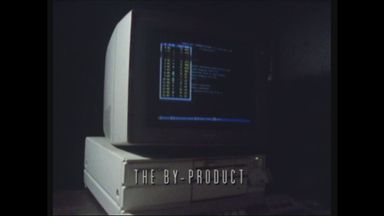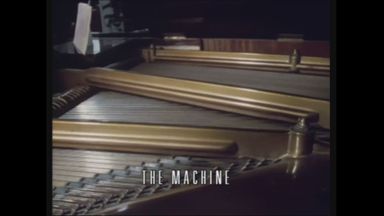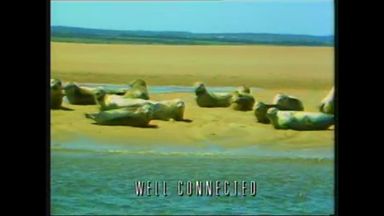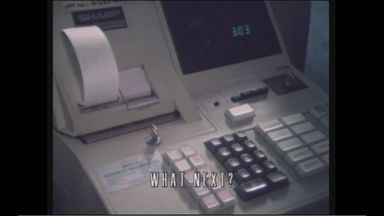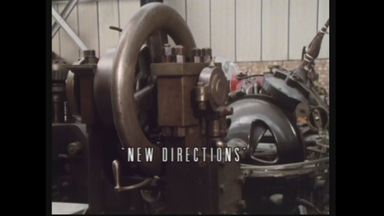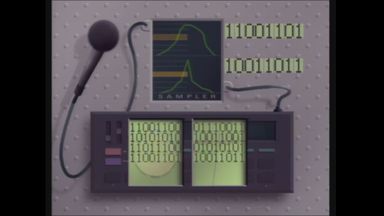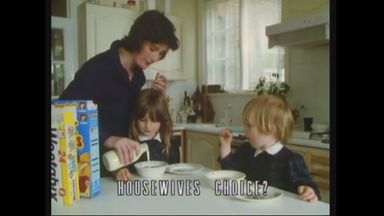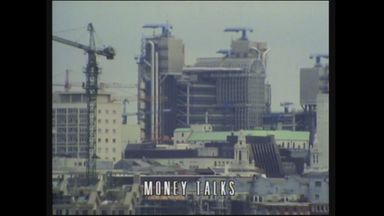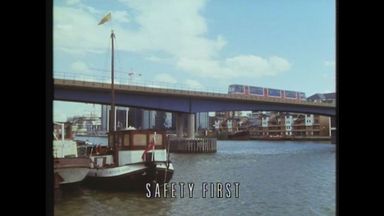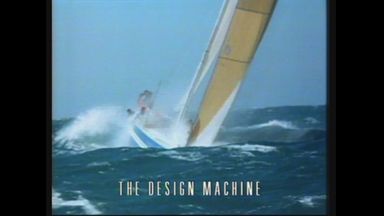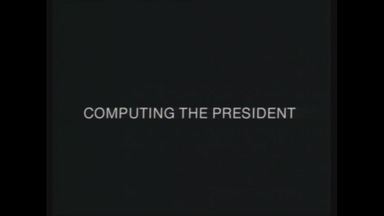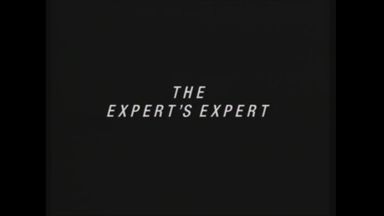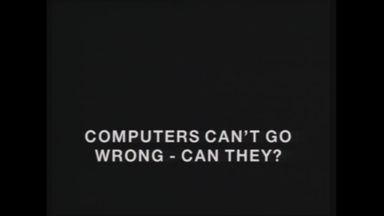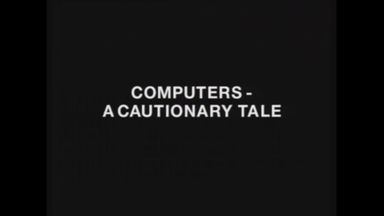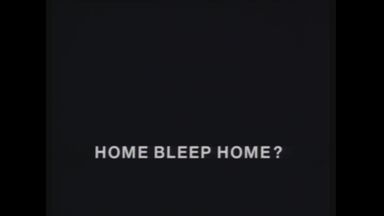Electric Avenue
1. Computing the President
Clips from this programme
Pre-Title Introduction: The George Bush American Presidential Election campaign advert 'The Dukakis Furlough Program' - Thank computers for much of his campaign success
Duration: 01:18The Reagan Presidential campaign (Ed Rollins, head of that 1984 campaign)-TV time spots and content chosen from computer-based research data- campaigns for elections trivialised? How to Win Consultants use computer techniques from the marketing world
Duration: 02:25Ronald Reagan had his speeches analysed by a computer showing what topics were vote winning via focus groups (Dr Richard Wirthlin, Ronald Reagan's Pollster), the same techniques used for George Bush election (Debra Vandenbussche-Market Opinion Research) (Doyle McManus-Los Angeles Times)
Duration: 03:53Ronald Reagan election campaign of 1984: New lengths: Using computer poling to find new ideas to adopt or leave ( A content free campaign!), putting words into the president's mouth (e.g. UN General assembly 23rd September 1984) (Dr Larry Sabato-University of Virginia)
Duration: 03:08Election campaign computers holding all the dirt on a candidate (Dukakis), so encouraging bland candidates, and holding political all voters and neighbourhood types, opinions and preferences in-part for targeted fund raising and tailored letters to them (Dr Bruce Carroll: President, Claritas Corp.)(Dr Larry Sabato-University of Virginia). Civil Liberties concerns
Duration: 06:05The American Election Campaigns: From Truman in 1948 (Speeches from backs of trains) to current computer driven campaigns and policies following public opinion poll data and analysis (Doyle McManus-Los Angeles Times) e.g. Granada and Libya/Gaddafi actions (Dr Richard Wirthlin-Ronald Reagan's Pollster) - Working for them or for us.
Duration: 04:39Electric Avenue - Series 1
1. The By-Product
First broadcast: 24th October 1988
Duration 24:19
First in a series of ten programmes about computers in society with Fred Harris. The By-product: The space race of the 1960s developed a new breed of lightweight computers to control spacecraft. A major by-product was the silicon chip. If it weren't for the Apollo project, the personal computer would still be a fantasy of the future. Film editor IAN MCKENDRICK Director TINA FLETCHER Producer TERRY MARSH
2. The Machine
First broadcast: 31st October 1988
Duration 24:15
A series of ten programmes about computers in society with Fred Harris 2:The Machine The magnificent Boston Symphony Organ is, in fact, two automatic player organs in concert. They were rescued, waterlogged, from two private residences, and restored by Boston University. Director DAVID HARRISON Film editor IAN MCKENDRICK Producer TERRY MARSH
3. Well Connected
First broadcast: 7th November 1988
Duration 24:17
A series of ten programmes about computers in society with Fred Harris. 3: Well Connected: On a windy beach near South Humberside, scientists from the Sea Mammal Research Unit try to catch a grey seal in their nets. The idea is to attach a radio transmitter to its back and track the seal's behaviour with a satellite overhead. Director DAVID HARRISON Producer TERRY MARSH
4. What Next?
First broadcast: 14th November 1988
Duration 24:14
Fourth in a series of tenprogrammes about computers in society with Fred Harris. What Next?: More and more shops are being fitted with electronic tills. These tills can send their daily sales information down a telephone line to a main computer. But what happens to the information then? Film editor IAN MCKENDRICK Director DAVID HARRISON Producer TERRY MARSH
5. New Directions
First broadcast: 28th November 1988
Duration 24:11
Fifth of ten programmes with Fred Harris. New Directions: The hobby computers of yesterday have changed the face of computing today. It has become accessible to ordinary people enabling them to develop new ideas in business and industry. Film editor PETER ESSEX Series producer TERRY MARSH
6. Chips and Drumsticks
First broadcast: 5th December 1988
Duration 23:49
Sixth in a series of ten programmes about computers in society with Fred Harris. Chips and Drumstick: In a London squat, two musicians built themselves a drum kit from cheap and freely available parts - silicon chips. They realised they had a winner on their hands, and joined up with a marketing company to sell large numbers to eager buyers. But attempts to build on this success have not gone so smoothly. Film editor IAN MCKENDRICK Director D J HARRISON Series producer TERRY MARSH
7. Housewives Choice?
First broadcast: 12th December 1988
Duration 24:10
Seventh of ten programmes about computers in society with Fred Harris. Housewives Choice?: Are you a 'modern clean liver', or a 'guilty eater'? Advertising executives pour over their computer Printouts trying to find the sort of person who will buy their breakfast cereal. Rather than promote the product to all and sundry, they are hoping to appeal to a 'niche market who will appreciate quality and pay extra for it. Photography NIALL KENNEDY Producer TERRY MARSH
8. Money Talks
First broadcast: 9th January 1989
Duration 24:17
Ten programmes with Fred Harris. 8: Money Talks: Lloyds of London will insure virtually anything. In 1987 a new computer system was introduced, but underwriters had to be persuaded that this was their way forward. Cameramen HENRY FARRAR, NIALL KENNEDY Producer TERRY MARSH
9. Safety First
First broadcast: 16th January 1989
Duration 24:03
A series of ten programmes with Fred Harris. 9: Safety First: When all else fails, a computer-controlled brain can at least be made to 'fail safe', which means in an emergency it simply stops. But it is more difficult to apply this principle to a computer-controlled plane. Cameramen NIALL KENNEDY , ROGER TWYMAN Producer TERRY MARSH
10. The Design Machine
First broadcast: 23rd January 1989
Duration 23:26
Last in a series of ten programmes about computers in society with Fred Harris. The Design Machine: Peter de Savary's yacht designers turned to computers to help build an America's Cup challenger in a matter of months. Computers can often speed up design work, but do they improve the quality of the end product? Film editor IAN MCKENDRICK Director DAVID HARRISON Producer TERRY MARSH
Electric Avenue - Series 2
1. Computing the President
First broadcast: 15th January 1990
Duration 22:36
When George Bush was elected president, he could thank computers for much of his campaign success. But political commentators claim that computers have raised disturbing civil rights issues. Producer PAUL SIMONS
Now playing
2. The Experts' Expert
First broadcast: 22nd January 1990
Duration 22:49
Expert systems are helping human professionals solve many problems. But as experience from the military shows, they can be misused. Commentary: Tom Mangold. Producer PAUL SIMONS
3. Computers Can't Go Wrong, Can They?
First broadcast: 29th January 1990
Duration 23:11
Computer software has no safety standards. Lives may have been lost by computer failures and experts predict major disasters in the future. Producer DAVID HARRISON
4. Computers: A Cautionary Tale
First broadcast: 5th February 1990
Duration 24:10
Computers a Cautionary Tale A recruitment agency is trying to computerise its office. What problems does it face? Commentary ANNA MASSEY Producer PAUL SIMONS
5. Home Bleep Home
First broadcast: 12th February 1990
Duration 23:22
Home Bleep Home: Robot servants are still a long way off, but automated homes offer ageing populations a graceful way to grow old. Commentary ANNA MASSEY Producer DAVID HARRISON








